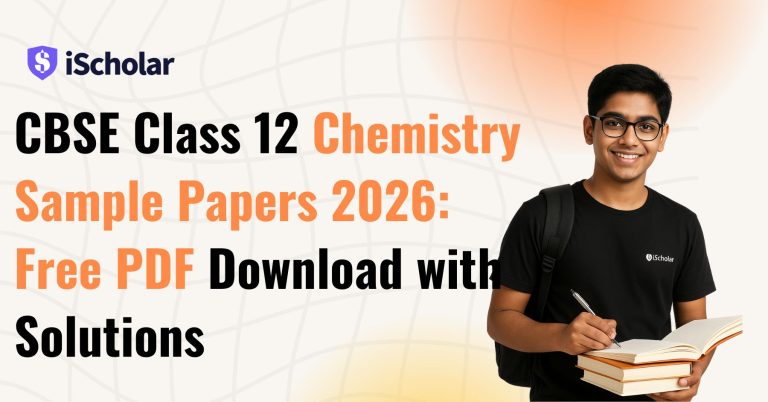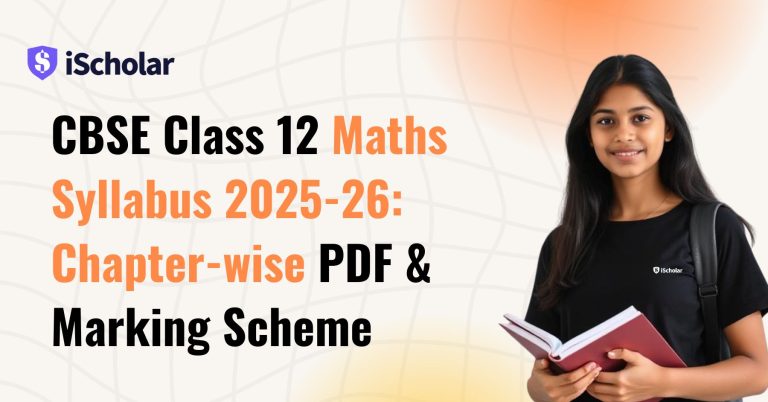The CBSE Class 12 Chemistry board exam 2025-26 is designed to improve conceptual knowledge while relating to practical uses. Although reference books can help with idea refinement, the NCERT textbook is the leading resource and covers the course in detail. Students should concentrate on comprehending organic reaction mechanisms, practising physical chemistry numerical problems, and routinely reviewing key inorganic ideas if they want to do well on board exams.
Understanding chemistry with a well-thought-out strategy that includes regular review, problem-solving, and conceptual clarity may be easier than expected.
We’ll break down the chemistry class 12 portion, provide insights into the chapter-wise weightage, and even highlight the chemistry class 12 practical syllabus. You can also download the official CBSE Class 12 Chemistry syllabus PDF at the end of this article.
CBSE Class 12 Chemistry 2025-26 Latest Exam Pattern
The CBSE Class 12 Chemistry syllabus 2025-26 follows a structured format, combining Theory and practical components. The updated exam format will be used for the CBSE Class 12 Chemistry exam in the 2025 – 2026 academic year. Questions from every chapter will be included in the format, emphasizing comprehension and application of essential ideas.
| S. No. | Bloom Typologies (as per NEP 2023) | Total % |
| 1 | Easy difficulty level: Demonstrate Knowledge | Understanding | 40% |
| 2 | Medium difficulty level: Application-based | 30% |
| 3 | Hard difficulty level: Analysis | Evaluate | Create | 30% |
| Total | 100% |
The division of the Theory and Practical Marks is:
- Theory: 70 Marks ( 3 Hrs)
- Practical/Project/Internal Assessment: 30 Marks
The class 12 chemistry syllabus chapter-wise weightage helps you focus better:
- Physical Chemistry: ~23 marks
- Inorganic Chemistry: ~19 marks
- Organic Chemistry: ~28 marks
The chemistry chapterwise class 12 distribution ensures balanced coverage of physical, organic, and inorganic chemistry.
CBSE Class 12 Chemistry 2025-26 Chapter-wise Weightage
The marking system for the 2025–2026 academic year will be designed to guarantee a fair assessment of students’ knowledge and analytical abilities. The final judgment will also heavily weigh practical assessments.
Theory Evaluation Scheme
| CBSE Class 12 Chemistry 2025-26 Unit Name | CBSE Class 12 Chemistry 2025-26 Chapter-wise Weightage |
| Solutions | 07 |
| Electrochemistry | 09 |
| Chemical Kinetics | 07 |
| d- and f-Block Elements | 07 |
| Coordination Compounds | 07 |
| Haloalkanes and Haloarenes | 06 |
| Alcohols, Phenols and Ethers | 06 |
| Aldehydes, Ketones, and Carboxylic Acids | 08 |
| Amines | 06 |
| Biomolecules | 07 |
| Theory Total | 70 |
Practical Evaluation Scheme
| CBSE Class 12 Chemistry Practical Chapters 2025-26 | CBSE Class 12 Chemistry Practical 2025-26 Chapter-wise Weightage |
| Volumetric Analysis | 08 |
| Salt Analysis | 08 |
| Content-based Experiment | 06 |
| Project Work | 04 |
| Class Record and Viva | 04 |
| Practical Total | 30 |
Updated CBSE Class 12 Chemistry Syllabus 2025-26 – Unit-wise Topics
The syllabus of chemistry class 12 is divided into three sections: Physical Chemistry, Inorganic Chemistry, and Organic Chemistry.
CBSE Class 12 Chemistry Syllabus: Physical Chemistry
CBSE Class 12 Chemistry Unit 1: Solutions
- Types of solutions, concentration expressions
- Solubility of solids and gases
- Raoult’s law and colligative properties
- Abnormal molecular mass, Van’t Hoff factor
CBSE Class 12 Chemistry Unit 2: Electrochemistry
- Redox reactions, EMF of cells
- Nernst equation and its applications
- Conductance, molar conductivity, Kohlrausch’s Law
- Electrolysis, galvanic cells, fuel cells, corrosion
CBSE Class 12 Chemistry Unit 3: Chemical Kinetics
- Reaction rate and factors affecting it
- Order, molecularity, rate law
- Integrated rate equations (zero & first order)
- Collision theory, activation energy, Arrhenius equation
CBSE Class 12 Chemistry Inorganic Chemistry
CBSE Class 12 Chemistry Unit 4: d- and f-Block Elements
- Transition metals: properties, trends, compounds (K₂Cr₂O₇, KMnO₄)
- Lanthanides and actinides: properties and comparison
CBSE Class 12 Chemistry Unit 5: Coordination Compounds
- Ligands, coordination number, nomenclature
- Bonding theories: Werner’s, VBT, CFT
- Isomerism and uses in analysis and biology
CBSE Class 12 Chemistry Organic Chemistry
CBSE Class 12 Chemistry Unit 6: Haloalkanes and Haloarenes
- Nomenclature, properties, reactions
- Optical rotation and substitution mechanisms
- Environmental impact of halogenated compounds
CBSE Class 12 Chemistry Unit 7: Alcohols, Phenols, and Ethers
- Preparation and properties
- Identification of alcohol types
- Phenol acidity and substitution reactions
- Uses of methanol, ethanol, ethers
CBSE Class 12 Chemistry Unit 8: Aldehydes, Ketones, and Carboxylic Acids
- Carbonyl compounds: preparation, properties, mechanisms
- Carboxylic acids: acidity, reactions, uses
CBSE Class 12 Chemistry Unit 9: Amines
- Classification, preparation, reactions
- Identification of 1°, 2°, 3° amines
- Diazonium salts: preparation and synthetic importance
CBSE Class 12 Chemistry Unit 10: Biomolecules
- Carbohydrates: types and biological roles
- Proteins and enzymes: structures and functions
- Vitamins and hormones: classification and role
- Nucleic acids: DNA, RNA (basic concepts)
CBSE Class 12 Chemistry Practical Syllabus 2025-26
The class 12 chemistry practical syllabus has been updated to include relevant, hands-on experiments.
A. Surface Chemistry
- Preparation of:
- Lyophilic sols – starch, egg albumin, gum
- Lyophobic sols – Al(OH)₃, Fe(OH)₃, As₂S₃
- Dialysis of prepared sol
- Study of emulsifying agents on emulsions
B. Chemical Kinetics
- Study of the effect of:
- Concentration & temperature on rate (Na₂S₂O₃ + HCl)
- Concentration & temperature on rate (Na₂S₂O₃ + HCl)
- Reaction rate of:
- I⁻ with H₂O₂ (varied I⁻ conc.)
- KIO₃ and Na₂SO₃ (clock reaction using starch)
C. Thermochemistry (Any one)
- Enthalpy of dissolution: CuSO₄ or KNO₃
- Enthalpy of neutralization: HCl + NaOH
- Enthalpy change: Acetone + Chloroform interaction
D. Electrochemistry
- Variation of cell potential in Zn/Zn²⁺ || Cu²⁺/Cu with electrolyte concentration
E. Chromatography
- Paper chromatography for pigments in leaves/flowers
- Separation of two cations in a mixture (with a large Rf difference)
F. Inorganic Compound Preparation
- Double salt: Ferrous Ammonium Sulphate / Potash Alum
- Potassium Ferric Oxalate
G. Organic Compound Preparation (Any one)
- Acetanilide
- Dibenzalacetone
- p-Nitroacetanilide
- Aniline yellow or 2-Naphthol Aniline dye
H. Functional Group Tests
Detection of:
- Unsaturation
- Alcoholic, phenolic
- Aldehyde, ketone
- Carboxylic, primary amine
I. Biological Tests
- Identification of carbohydrates, proteins, and fats in pure and food samples
J. Volumetric Analysis
Standardize KMnO₄ using:
- Oxalic acid
- Ferrous Ammonium Sulphate
(Students must prepare standard solutions themselves)
K. Qualitative Analysis
Detection of one cation and one anion in a given salt
Cations:
Pb²⁺, Cu²⁺, Al³⁺, Fe³⁺, Mn²⁺, Ni²⁺, Zn²⁺, Co²⁺, Ca²⁺, Sr²⁺, Ba²⁺, Mg²⁺, NH₄⁺
Anions:
CO₃²⁻, S²⁻, SO₃²⁻, NO₃⁻, NO₂⁻, Cl⁻, Br⁻, I⁻, SO₄²⁻, PO₄³⁻, CH₃COO⁻, C₂O₄²⁻
(Insoluble salts excluded)
L. Project Work (Scientific Investigations)
Suggested Projects:
- Oxalate in guava at different ripening stages
- Casein in different milk samples
- Preparation & comparison of soybean milk
- Effect of preservatives (e.g., KHSO₃)
- Enzyme activity: Salivary amylase on starch
- Fermentation rate of natural materials
- Extraction of essential oils (e.g., aniseed, cardamom)
- Detection of adulterants in common foods
CBSE Class 12 Chemistry Preparation Strategy Based on Syllabus
Use this well-planned approach to ace the CBSE chemistry class 12 board exam.
Study Plan by Term or Month
July -Sept: Complete term one chemistry syllabus class 12
Oct – Dec: Focus on chemistry class 12 second term syllabus
Jan – Feb: Start complete syllabus revision
March: Solve mock tests, practice diagrams, and formula recaps
NCERT-Based Revision Tips
Stick to NCERT for concept clarity. Most of the class 12 chemistry syllabus questions are directly or indirectly based on it.
Important Diagrams & Formulas
- Electrochemical cell diagrams
- Reaction mechanisms
- Structures of biomolecules
- Formulas for colligative properties, the Nernst equation, and rate laws
How to Balance Theory + Practical
- Allocate fixed days for practical work.
- Prepare the lab file and update it regularly.
- Don’t ignore the chemistry class 12 practical syllabus during theory revision
Chapter Priority for Revision
Start with Physical Chemistry of Class 12, then move to Organic Chemistry, and finally revise Inorganic Chemistry. Use this order for efficient coverage during the revision of the term two chemistry class 12 syllabus.
Download CBSE Class 12 Chemistry Syllabus 2025-26 PDF
The below mentioned CBSE Class 12 Chemistry chapter-wise is an ideal preparation material for the students aiming to ace the examination with a great score.
Official CBSE PDF Link
Download the CBSE Class 12 Chemistry syllabus PDF
Or
Downloading Steps of CBSE Class 12 Chemistry Syllabus
- Go to the CBSE Academic portal.
- Click on Curriculum 2025-26
- Select “Senior Secondary Curriculum”
- Download the chemistry syllabus for class 12 under the Science stream
FAQs on CBSE Class 12 Chemistry Syllabus 2025-26
Q1. Which Chemistry Class 12 chapters are being eliminated this year?
CBSE will formally notify students about the removed portion of Chemistry Class 12. Use the most recent CBSE class 12 chemistry syllabus for 2025–2026 for the time being.
Q2. Is the chemistry syllabus for 2025 – 2026 reduced?
There isn’t yet a formal reduction to the class 12 chemistry syllabus. Studying every topic in organic, inorganic, and physical chemistry is necessary.
Q3. Are NCERT Chemistry questions enough for Class 12?
Yes, NCERT is the leading resource for achieving high scores in the Class 12 CBSE Chemistry board. Use the Chemistry class 12 syllabus for both Term 1 and Term 2.
4. How can I get full marks in my Chemistry practicals?
Keep your lab file organized, pay attention to the experiments in the class 12 chemistry practical syllabus, understand the viva questions, and finish the project well in advance.
5. Do Chemistry Terms 1 and 2 have their own separate syllabus?
Yes. While physical and inorganic topics are covered in the first term of the class 12 chemistry syllabus, organic chemistry chapters are typically included in the second term.
Mastering the CBSE class 12 chemistry syllabus 2025 – 26 isn’t just about reading chapters, it’s about smart planning, regular practice, and understanding key concepts. Use this article to tackle both theory and practical portions, track the deleted portion of class 12 chemistry, and revise chapterwise for better retention.
Stay tuned with iScholar for more expert tips, CBSE Class 12, and study strategies to help you succeed in your learning journey!





